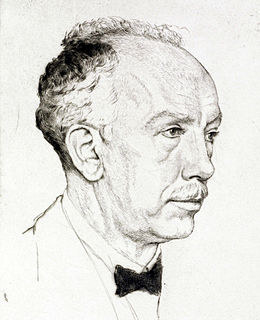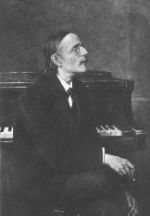
Die Herzogin von Chicago is an operetta in two acts, a prologue, and an epilogue. The music was composed by Hungarian composer Emmerich Kálmán with a libretto by Julius Brammer and Alfred Grünwald. It premiered in Vienna at the Theater an der Wien, on April 5, 1928 and played for 372 performances. The work was presented in out-of-town tryouts in Newark, New Jersey and Springfield, Massachusetts by the Shuberts in 1929, but it did not make it to Broadway. The piece was forgotten until 1997, when the Lubo Opera Company performed it in concert in New York, after which Light Opera Works of Illinois performed the work in 1998 in a fully staged version with a new translation by Philip Kraus and Gregory Opelka. In 1999, Richard Bonynge made a recording of the work, which revived international interest in it.
The Four Last Songs, Op. posth., for soprano and orchestra are – with the exception of the song "Malven" (Mallows), composed later the same year – the final completed works of Richard Strauss. They were composed in 1948 when the composer was 84.

An die ferne Geliebte, Op. 98, is a composition by Ludwig van Beethoven written in April 1816. It is considered to be the first example of a song cycle by a major composer.
Singer/actress Charlotte Ander was the daughter of German stage/film couple Rudolf Andersch and Ida Perry. Ander was trained at the Berliner Staatstheater. Charlotte was a star in the silent era before making the transition to sound. Her film career started in 1920 with the film Die letzte Stunde and Danton (1921). Innumerable starring roles in silent movies and early talkies with super-stars Emil Jannings, Marlene Dietrich, and Hans Albers followed.
The Symphony No. 8 "Lieder der Vergänglichkeit" by Krzysztof Penderecki is a choral symphony in twelve relatively short movements set to nineteenth and early twentieth-century German poems. The work was completed and premiered in 2005. The symphony has an approximate duration of 35 minutes. Penderecki revised the symphony in 2008 by adding a few more poem settings and the piece has expanded to around 50 minutes.

"Morgen!" ("Tomorrow!") is the last in a set of four songs composed in 1894 by the German composer Richard Strauss. It is designated Opus 27, Number 4.

Rudolf Bernauer (1880-1953) was an Austrian lyricist, librettist, screenwriter, film director, producer, and actor.

"Heimliche Aufforderung", Op. 27 No. 3, is one of a set of four songs composed by Richard Strauss in 1894. It was originally for voice and piano, but it was orchestrated in 1929 by the German conductor Robert Heger. The text is from a poem in German by John Henry Mackay.
Bote & Bock is a German publishing house founded in Berlin in 1838 by Eduard Bote and Gustav Bock (1813-1863).

"Traum durch die Dämmerung", is both a German poem by Otto Julius Bierbaum and a Lied by Richard Strauss, his Op. 29/1. The opening line is "Weite Wiesen im Dämmergrau". It is the first of three songs by Strauss based on love poems by Bierbaum, composed and published in Munich in 1895, and dedicated to Eugen Gura. The works were scored for medium voice and piano, and published by Universal Edition as 3 Lieder mit Klavierbegleitung, later with English versions and orchestral arrangements.

Franz Schubert's best known song cycles, like Die schöne Müllerin and Winterreise are based on separate poems with a common theme and narrative. Other song cycles are based on consecutive excerpts of the same literary work: Schubert's "Ave Maria" is part of such a song cycle based on excerpts of the same poem, in this case by Walter Scott.

Die Tageszeiten is a choral composition written for male voice choir and orchestra by Richard Strauss (1864–1949), TrV 256, Op. 76. It consists of four movements: "The Morning", "Afternoon Peace", "The Evening" and "The Night". The lyrics are based on four poems of the same names by Joseph Eichendorff (1788–1857) from his collection Wanderlieder. The work was premiered on 21 July 1928 with the Wiener Schubertbund and the Vienna Philharmonic as part of the Schubert centenary.
Picander's cycle of 1728–29 is a cycle of church cantata librettos covering the liturgical year. It was published for the first time in 1728 as Cantaten auf die Sonn- und Fest-Tage durch das gantze Jahr. Johann Sebastian Bach set several of these librettos to music, but it is unknown whether he covered a substantial part of the cycle. This elusive cycle of cantata settings is indicated as the composer's fourth Leipzig cycle, or the Picander cycle.

Geistliche Gesänge, Op. 110, are three motets by Max Reger. He composed them between 1909 and 1912:
Wilhelm Killmayer, a German composer, wrote several song cycles, which form a substantial part of his compositions. The earliest cycle dates from 1953, the last was completed in 2008. He set poems by German romantic writers such as Friedrich Hölderlin and Joseph von Eichendorff, but was also inspired by French, Greek and Spanish poems, and by texts from the 20th-century poets Georg Trakl and Peter Härtling. He used mostly piano to accompany a singer, but also added percussion or other instruments, and scored some cycles in a version for voice and orchestra. His Hölderlin-Lieder, setting poems from the author's late period, were performed at major festivals and recorded.

"Freundliche Vision" is both a German poem by Otto Bierbaum and a Lied by Richard Strauss, his Op. 48/1. The opening line is "Nicht im Schlafe hab ich das geträumt". It is the first of five songs by Strauss, composed in 1900 and published in Berlin in 1901 by Adolph Fürstner. The works were scored for voice and piano, and arranged for voice and orchestra in 1918 by the composer.

Sechs Lieder, Op. 68, is a collection of six Lieder by Richard Strauss. He composed them, setting poems by Clemens Brentano, in 1918 for soprano and piano, and orchestrated one in 1933 and five in 1940. The piano version was first published by Adolph Fürstner in Berlin in 1919. They are also known as Brentano Lieder.

Weihnachtslieder, Op. 8, is a song cycle of six lieder related to Christmas by Peter Cornelius, who set his own poems for voice and piano in 1856. The full title is: Weihnachtslieder : ein Cyklus für eine Singstimme mit Pianofortebegleitung : Op. 8 / Text und Musik von Peter Cornelius. Cornelius dedicated the songs to his sister, Elisabeth Schily. The song "Die Könige" about the Biblical Magi has been translated and published separately. English versions come under the title "The Three Kings". It incorporates in the piano accompaniment Philipp Nicolai's hymn "Wie schön leuchtet der Morgenstern".

Six Motets, Op. 82, are six motets for choir a cappella by Friedrich Kiel. He set selected psalm verses in German. The motets were published in 1883 by Bote & Bock, dedicated to H. A. Köstlin, as Sechs Motetten für gemischten Chor a cappella.















